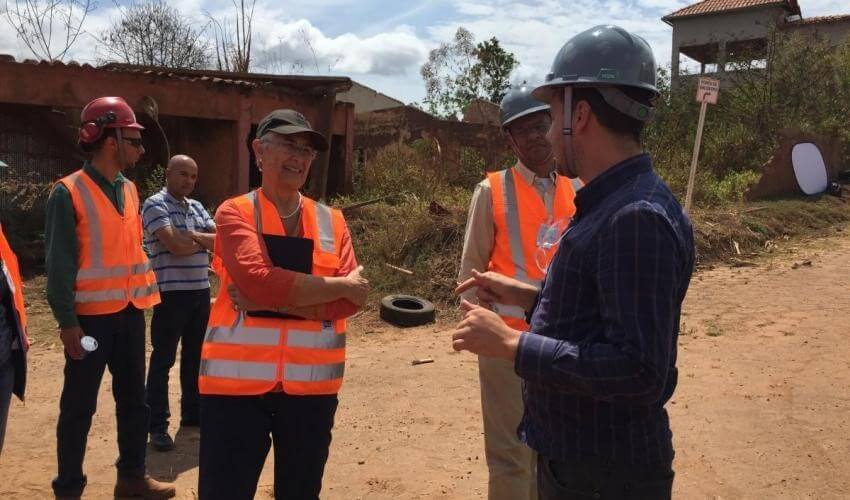International entity to advise the Renova Foundation in a scientific and independent way in its actions aimed at the recovery of the areas affected by the collapse of the Fundao dam in Mariana (MG))
A team of professionals managed by the International Union for Conservation of Nature (IUCN), an institution of global reference in the area of environmental conservation, started its field work activities in the Doce River Basin region through an Independent Scientific and Technical Advisory Panel (ISTAP), which received the name Doce River Panel.

Coordinated by the environmentalist and former Minister of the Environment of Ecuador, Yolanda Kakabadse, the Panel will formulate recommendations that will support the solutions aimed at the recovery of the Doce River. | Photo: IUCN-Stephen Edwards
Coordinated by the environmentalist and former Minister of the Environment of Ecuador, Yolanda Kakabadse, the team will formulate recommendations that will support the solutions aimed at the recovery of the areas affected by the collapse of the Fundao dam.
“Although the issues are complex, there is an incredible opportunity to create an international model for repairing similar landscapes. I am confident that the Panel – with members that have a vast experience in biology, engineering, geochemistry, economics, governance, social issues and management – can contribute to the recovery of the river,” says Kakabadse.
After visiting the field, the experts of the Panel are now reviewing the 42 Renova Foundation programs. This will be the starting point for setting priorities and developing a working plan for the next five years. First, the actions of the Doce River Panel are divided in six thematic axes, considering aspects of terrestrial, marine and riverine life: strategy; toxicology; impacts on ecosystems; ecosystem remediation; water; waste and tailings management and sustainable economic practices.
The IUCN has extensive experience in nature conservation. Its network includes about 16,000 experts and it has coordinated several independent panels that have provided recommendations, for example, for the remediation of oil spills in the Niger Delta and to minimize the impacts of the exploitation of gas on gray whales in Russia.
According to Roberto Waack, CEO of the Renova Foundation, the work done by IUCN will be fundamental for assessing the efficiency of the developed solutions.
The agenda of the actions, conclusions and recommendations will be public, as to enhance transparency. All information is available at: www.iucn.org/riodocepanel.
Meet the members of the Doce River Panel
The members were selected through an open selection process. In addition to professional experience, the institution applied indicators such as global, local knowledge and gender. Meet the experts:
The president of the Doce River Panel is Ecuadorian Yolanda Kakabadse, former Minister of the Environment of Ecuador, former president of IUCN, co-founder of “Fundacion Futuro Latinoamericano” and chairman of the board of WWF International, in this role until the end of 2018. She has received numerous honorary awards, including the Golden Ark Order (1991), the UN 500 Global Award (1992) and the Zayed Prize (2001). She lives in Quito, Ecuador, and she will focus on the overall coordination of the Panel and on matters of governance.
Keith Alger is a consultant with experience in ecosystem management and environmental restoration, former senior vice president of Rare for the Americas and Africa. He is a US citizen, residing in Maryland, United States, and has managed several research and multidisciplinary panels in Brazil and in the world and will focus on issues related to biodiversity.
Luiza Alonso is a professor of Sociology focused on the organization and implementation of social programs for low income populations, social movements and labor relations at the Catholic University of Brasilia and member of FUNDHAM (American Man Museum Foundation). She lives in Brasilia and will focus on issues related to social development.
Francisco Barbosa, vice president of the Panel, is a professor at the Department of General Biology at the Federal University of Minas Gerais (UFMG). Having spent much of his career dedicated on the Doce River basin, where he conducted water monitoring research, he now lives in Belo Horizonte and will focus on issues related to freshwater biology.
Hubert Roeser is a professor at the Department of Environmental Engineering at the Federal University of Ouro Preto (UFOP) who has dedicated 40 years of his career on the Doce River basin. His research is focused on water quality, sediment, environmental diagnostics, hydrology and the presence of heavy metals in rivers. He is a German citizen, lives in Ouro Preto and will focus on issues related to geochemistry and toxicology.
Luis E. Sanchez is a professor of mining engineering at the Polytechnic School of the University of Sao Paulo (USP). His research covers topics such as environmental impact assessment and sustainability in extractive industries. He lives in Sao Paulo and will focus on issues related to engineering and environmental impact.
Maria Cecilia Wey de Brito, has worked for over 30 years with resolutions on socio-environmental problems. She works at the EKOS Brasil Institute, lives in Sao Paulo and will focus on issues related to landscape management.
About IUCN
The International Union for Conservation of Nature (IUCN) is composed exclusively of governmental organizations and representatives of civil society. Founded in 1948, IUCN is the largest and most diverse environmental network in the world. The institution, in addition to extensive experience, has resources and connections with more than 1,300-member organizations and the contribution of around 16 thousand experts. IUCN is also recognized as a global authority for nature-related issues and undertaking measures to protect it.
